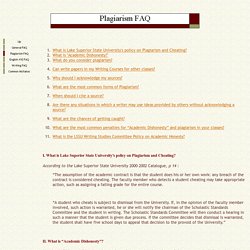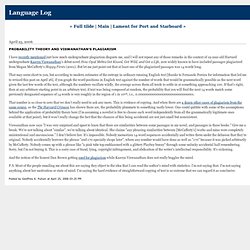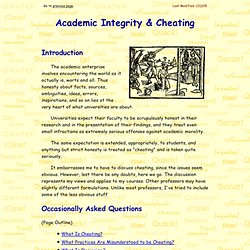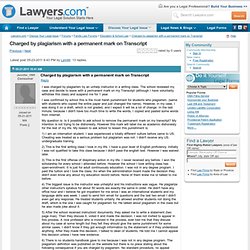

Plagiarism FAQ. These are also considered among the more grievous examples of “Academic Dishonesty” and are usually prosecuted to the fullest extent possible.

At LSSU, this can mean dismissal from the University. III. What do you consider plagiarism? Since my background is in Rhetoric and Composition, my view of plagiarism is based on two assumptions. First, I can’t help you learn to be a better writer if the writing I am looking at wasn’t written by you. So let’s start with a definition—plagiarism is the use of someone else’s words or ideas as your own without giving appropriate credit or without the person’s consent to use his or her words or ideas without acknowledgment. There are several factors at work here, but primarily the thing you need to remember is that you have been given an assignment in order to further your education in a particular way. Finally, there are things about citations and quotations of other people’s work that you probably don’t know. IV. V. IX. X. My official line is: XI.
Plagiarism in Science Theses Study. Probability theory and Viswanathan's plagiarism. Probability theory and Viswanathan's plagiarism I have recently mentioned just how much undergraduate plagiarism disgusts me, and I will not repeat any of those remarks in the context of 19-year-old Harvard undergraduate Kaavya Viswanathan's debut novel How Opal Mehta Got Kissed, Got Wild, and Got a Life, now widely known to have included passages plagiarized from Megan McCafferty's Sloppy Firsts (2001).

But let me just point out that at least one of the plagiarized passages was 14 words long. That may seem short to you, but according to modern estimates of the entropy in ordinary running English text [thanks to Fernando Pereira for information that led me to revised this post on April 26], if you graph the word positions in English text against the number of words that would be grammatically possible as the next word given the last few words of the text, although the numbers vacillate wildly, the average across them all tends to settle in at something approaching 100.
P.S. Nine_things_you_should_know.pdf. Academic Integrity and Cheating. Introduction The academic enterprise involves encountering the world as it actually is, warts and all.

Thus honesty about facts, sources, ambiguities, ideas, errors, inspirations, and so on lies at the very heart of what universities are about. Universities expect their faculty to be scrupulously honest in their research and in the presentation of their findings, and they treat even small infractions as extremely serious offenses against academic morality. The same expectation is extended, appropriately, to students, and anything but strict honesty is treated as "cheating" and is taken quite seriously.
It embarrasses me to have to discuss cheating, since the issues seem obvious. Occasionally Asked Questions (Page Outline) What Is Cheating? As applied to university students, cheating (academic dishonesty) is: Some specific forms of cheating include: Charged by plagiarism with a permanent mark on Transcript - Lawyers.com Community. "My question is: Is it possible to ask school to remove the permanent mark on my transcript?

My intention is not trying to be dishonesty" You are certainly free to ask but the school has no legal obligation to consider the request, to act on it, or to do it. Your intention has no bearing on whether it is plagiarism or not. If the words are someone else's it is plagiarism whether you intended it to be or not. In your case it WAS intentional which is the worst possible infraction and you admit this when you stated: "In the last minute, because I didn't have too much time to write the words, I copied and pasted some words from internet" "1) I am an internation student. Regardless of what your former schools do, your school here clearly has a policy about plagiarism and this instructor did as well.
MANY international students have problems in this area and believe they should have special considerations because of this status. "2) This is the first writing class I took in my life.